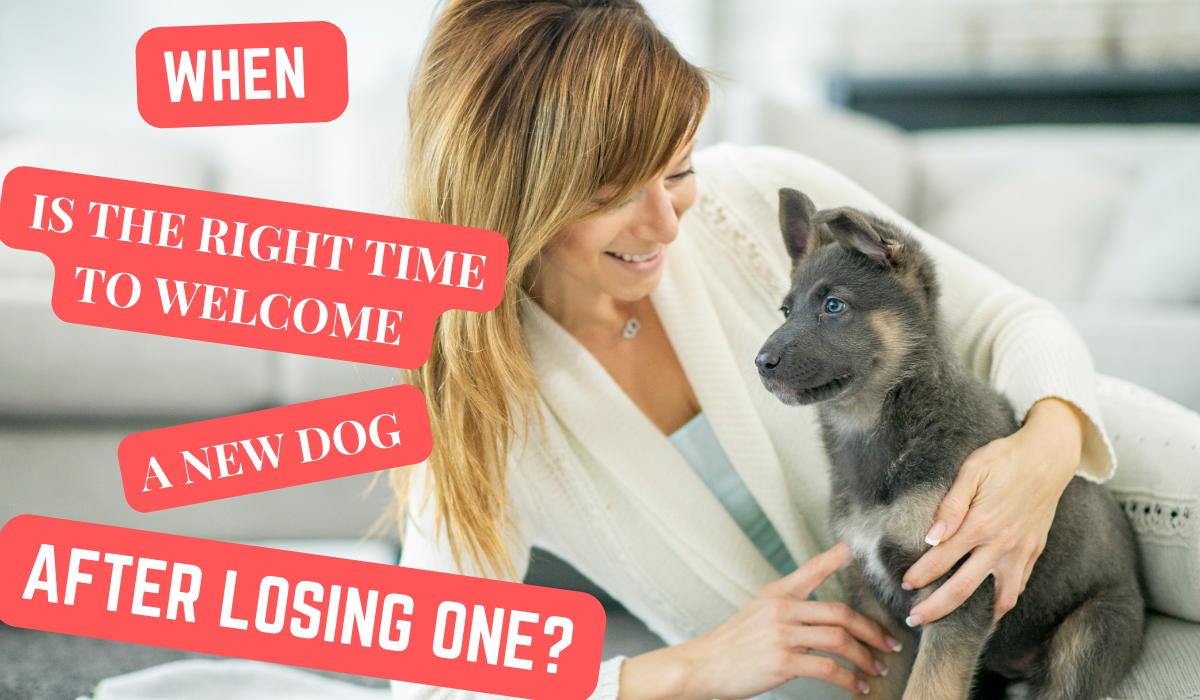INTRODUCTION – GETTING A NEW DOG AFTER LOSING ONE – WHEN IS THE RIGHT TIME?
Losing a beloved dog is an incredibly heart-wrenching experience. Our bond with our pets is unique; their absence leaves a significant void in our lives.
Unfortunately, my husband and I have experienced the devastating loss of not one but two of our beloved dogs within weeks of each other. The first to pass was our beautiful five-year-old Labrador, whose vibrant and calming presence filled our home. Her illness came on suddenly; within 24 hours of learning about her liver failure, we had to say our final goodbyes. The swiftness of her passing left us in shock and deep sorrow.
As we grappled with the sudden loss of our Labrador, we were already bracing ourselves for the inevitable farewell to our elderly Shih Tzu, Ted. Ted had been suffering from chronic lung problems, and we had spent the last twelve months preparing for the day we would lose him. Despite our mental preparation, nothing could have softened the blow of his passing. Losing both dogs in such a short period left an unimaginable void in our lives.
Deciding to get a new dog after losing one is a complex and deeply personal decision. While welcoming a new furry friend into your life can be comforting, several factors might give you reasons to pause. The following is a list of fundamental challenges that must be considered before you venture forth and bring a new little pup into your home.
Please stay tuned to the end, and I will let you know how we tackled this dilemma and how things worked out for us. All I can say is that it wasn’t straightforward.
1. Grieve for Your Dog
The sorrow that comes from a dog’s passing can be heavy. Dogs are not just animals; they are like family. The bond you shared was such a deep bond, and getting a new dog can feel like a betrayal to your lost friend.
Grieving is a necessary process, and taking the time to fully move through your grief before deciding to bring a new pet into your life is of utmost importance. Getting another dog might not give you the space and time to heal correctly. You may also fear a new dog will only remind you of the one you lost, thus making the bereaved time even harder.
2. Considering the Rest of the Family
When a dog dies, the entire family is hurt, and everyone mourns in their way. You may be prepared to bring a new dog home, but other family members are not.
Children: It might be hard to understand and process their grief. It may take them longer and require more help before they can share their lives with another dog again. Alternatively, your partner or other adults in the home may not wish to endure the process of losing a much-loved pet again. So, talk with your family openly and be honest about how they feel and if they are ready for a new companion dog. Ensuring everyone is informed can also avoid further stress and allow a warm and supportive location for the new dog.
3. Consider other pets.
If you have other pets at home, they also have their own needs and feelings. Grieving the loss of a companion may put stress on the pet, and adding another dog into the mix right away could also create behaviour issues. Every pet has its personality and methods of coping.
4. Time Commitment
Training a new puppy is a labour of love, patience, sweat, and more patience. House training, obedience training, and socialisation are only a few areas that need to be worked on when you bring your new puppy home. Toilet training is challenging, and it can entail taking your puppy outdoors every couple of hours and throughout the night.
Obedience training: Obedience training teaches basic commands like sit, stay, and come, a discipline that needs regular practice and reinforcement. Socialisation is also crucial as it teaches your puppy how to interact with different people, pets, and settings, making it less likely to develop fear or aggression.
They must get used to their new environment, the people in it and the rules of their new home. This usually includes addressing separation anxiety, as puppies tend to suffer from this syndrome when away from their littermates and do not get into anything harmful.
The adjustment period also entails teaching your young puppy to get along with household members and adhere to rules and boundaries, if any. It is a time-consuming process you cannot get over; it consumes most of your attention and patience.
All in all, a new puppy is a big-time commitment and shouldn’t be taken lightly. With the above in mind, if you can accommodate these demands, you are ready to offer a happy and safe place for your new four-legged friend.
5. Long-term commitment
Being ready for responsibility means being prepared for the unexpected. Emergencies and unforeseen circumstances can arise, and a plan for your dog’s care in such situations is essential. This includes having a trusted friend or family member who can step in if you cannot temporarily care for your pet.
CONCLUSION – GETTING A NEW DOG AFTER LOSING ONE.
Suffice it to say, my adult children were not surprised that shortly after Ted died, we threw ourselves into the search for a new adoptee. Yes, we were still heartbroken over Sally and Ted; Sally’s death was hard to accept as she was a young, healthy dog. However, Ted was a different type of grief, as we felt we had been grieving over him for the past 12 months, ever since we heard his diagnosis.
I have to be honest: we couldn’t get Sally and Ted out of our minds for the first few weeks after adopting Murphy (a cross between a poodle and a Shih Tzu). Losing both our dogs within such a short span had left an indelible mark on our hearts. Bringing Murphy into our home felt like a significant change and was a real culture shock. Murphy is a livewire, full of energy and mischief. My husband and I can’t remember ever having a pup this feisty. His playful antics and boundless energy were both challenging and delightful.
We know we are much older, and training a new puppy never seemed so hard. However, it has been incredibly worth it. Despite his naughtiness, Murphy has brought a spark back into our lives. His lively presence has filled our home with joy and laughter, reminding us of the vibrant energy that a new dog brings.
Getting another dog so soon after our loss was a profoundly personal decision. Each dog we have had has been special in their unique way, bringing us immense love and joy. Life is short, and I cherish sharing it with four furry paws. The house doesn’t feel the same without the pitter-patter of little feet. Murphy has shown us that, even after loss, our hearts always have room for more love.
https://lindamcowan.com/losing-a-pet-suddenly-5-helpful-tips




Pingback: 10 INCREDIBLE REASONS WHY FURRY FRIENDS HELP PHYSICAL AND MENTAL HEALTH.
Why do people keep pets, why people love pets.
tips for choosing a pet, advantages of different pet breeds.secrets of pet care, how to ensure the health of your pet.what you didn’t know about pets, how pets influence us.tips for training pets, how to teach a parrot to talk.
domestic animals and their uses [url=http://www.petstorepetsupply.com/index.php/2024/06/15/container-gardening-basics/]http://www.petstorepetsupply.com/index.php/2024/06/15/container-gardening-basics/[/url] .